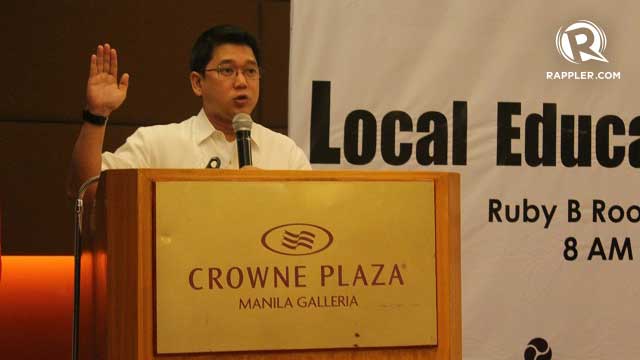SUMMARY
This is AI generated summarization, which may have errors. For context, always refer to the full article.

MANILA, Philippines – High school and college graduates do not always have to go to Metro Manila to look for work. After all, urban centers have sprouted in many regions, presenting job opportunities.
To make Quezon City Mayor Herbert Bautista’s suggestion possible, however, local government units (LGUs) have to start reforming school curricula to be responsive to the needs of their regions.
“Kasi buhay na naman mga lugar sa ibang bahagi ng Pilipinas. This is similar in other metropolitans [like Cebu, Davao],” Bautista, president of the League of Cities of the Philippines, told fellow local executives at a workshop on basic education policy reforms on Thursday, October 10, in Pasig City.
(The economy is already alive in other parts of the country. This is similar in other metropolitan areas.)
The workshop was organized by ULAP or Union of Local Authorities of the Philippines, the umbrella organization of all local government leagues.
But Bautista, a member of Metro Manila’s Regional Development Council, also said the education sector in LGUs should prepare graduates to be competitive enough for opportunities abroad.
By 2015 the Asean economy “will intensify” competition between Filipino graduates and workers from neighboring countries, he said.
“Ang Pilipino dapat magaling sa Pilipinas at kahit saan (A Filipino should be excellent in the Philippines and anywhere else),” he said.
Contextualized curriculum
Some LGUs have come up with innovations in their school curricula.
In Dumingag, Zamboanga del Sur, farming is the people’s bread and butter. Mayor Jun Pacalioga realized that what contributed to the worsening poverty in the municipality was the fact that their high school graduates did not have skills in farming.
“Hindi puwedeng hiwalay ang education program sa kahirapan (Education programs should not be removed from the realities of poverty),” he said.
So what the municipal government did was integrate sustainable organic agriculture in the school curricula, from kindergarten to college. After three years, he said, half of Dumingag’s 44 barangays were studying farming.
“We should contextualize curriculum, [and teach the] youth based on [the] real situation,” Pacalioga said.
Competitive HS graduates
On Thursday, in the Senate, Sen Sonny Angara had a similar concept, but this time addressing the needs of disaster-prone areas.
He filed a bill that would institutionalize the teaching of environmental protection to elementary and high school students throughout the country.
“Making environment protection and conservation [a] regular subject in schools will truly pay-off five to ten years from now,” Angara said in a statement.
Bohol Governor Edgardo Chatto, secretary-general of the League of Provinces of the Philippines, said basic education should change the mindset of students that they need to pursue higher education to be competitive in the job market.
“Mindsetting in the Philippines, traditionally, is if it is possible, all children should get a college or university diploma. But the real situation is that there are kids that cannot finish college and can’t even proceed to college because of limitations. [They] may have educational limitations, but they have skills,” Chatto said in a mix of English and Filipino. – Rappler.com
Add a comment
How does this make you feel?
There are no comments yet. Add your comment to start the conversation.